Researching information on baby formula can be overwhelming! We’ve done our best to make it easy for you. Read on for our guide to the best organic baby formula, including what to look for in a formula and what to avoid, organic versus conventional formula, types of organic formula, and our recommendations for the best US and European brands of organic baby formula.
Medically reviewed and co-written by Jamie Johnson, Registered Dietitian Nutritionist (RDN), and Lauren Braaten, Pediatric Occupational Therapist (OT).
Organic Baby Formula
Deciding how and what to feed your baby are important questions all parents face. While some parents choose to breastfeed, for others this is not an option. Fortunately, there are many excellent quality, organic baby formulas to help ensure your little one is getting the best nutrition possible.
Infants can also benefit from supplementing with organic baby formula when breast milk alone isn’t enough to meet a growing baby’s nutritional requirements. Supplementing or switching to organic baby formula may be necessary if your baby isn’t gaining weight adequately, has trouble latching, or is diagnosed with jaundice. A parent’s return to work or simply a desire to no longer breastfeed may also be reasons where introducing organic baby formula is needed.
Benefits of Organic Baby Formula
Organic formula is a wonderful alternative or supplement to breast milk. In order to receive an “organic” label, companies need to comply with specific guidelines set out by the United States Department of Agriculture (USDA). This ensures organic baby formula won’t contain any synthetic ingredients and the cows will have eaten higher quality food.

Frequently Asked Questions
There is no right answer because there is no one-size-fits-all for infant baby formulas. This will depend on your baby’s needs, your preferences, and budget.
This depends on your budget and what you are comfortable with feeding your baby. Organic baby formulas will be free of synthetic pesticides, but more expensive than regular baby formula so this is a personal decision for you and your family.
Organic formula will be the same nutritionally as a comparable standard formula, however it will be free of synthetic pesticides, which may cause harmful health effects in the long term.
What to Look for in a Formula
All formulas sold in the US have to meet strict FDA guidelines and approval, are safe for your baby, and have a specific fat/carbohydrate/protein ratio and vitamin and mineral profile to meet an infant’s needs. However, there may be some specific ingredients you want to look for to support your baby’s needs (you’ll need to look at the ingredients list). The first ingredient to look for is the type of protein found in the formula (usually cow’s milk or soy) to make sure you aren’t giving your baby something he cannot tolerate. Cow’s milk protein is the first choice but if your baby cannot tolerate it, then look for a soy-based formula. Then look for the type of carbohydrate that’s predominantly found in the formula. Lactose is preferred over corn sugar/syrup, since that’s the main carb found in breast milk. After that, look for the following…
Iron
Most infant formula sold in the US is fortified with iron but to be sure, always read the label. Iron is important, especially for infants, to help prevent iron deficiency anemia, which can lead to developmental delays if left untreated. Most babies have enough iron stores from mom for the first 4 months, but after that, it’s important to give iron-fortified foods or supplements (or formula) to help prevent this deficiency.
DHA and APA
DHA (docosahexaenoic acid) and ARA (arachidonic acid) are fatty acids found in breastmilk (and fatty fish, eggs, and other foods) that may or may not be included in a formula as it’s not required to add them, but have been shown to support brain and eye development. More health benefits could less risk of skin and respiratory allergies and illnesses.
Probiotics and Prebiotics
These aren’t required to be included in formulas either but breast milk also contains these so many companies include them to try to get formula closer to the gold standard of breast milk. Including them may help infants’ GI tract resemble those breastfed babies. According to the American Academy of Pediatrics, probiotics, or good bacteria, in infant formula can help promote a balance of bacteria by offsetting the growth of bad bacteria which can cause infections and inflammation. Formula supplemented with probiotics may help prevent and treat infectious diarrhea and eczema and reduce the risk of food allergies, asthma, UTI’s, and colic symptoms.
Babies fed formula supplemented with prebiotics, or the food probiotics feed on, tend to have better stool consistency and frequency and have a higher concentration of the good bacteria bifidobacteria in their intestines compared to those fed standard formula. Prebiotics added to formula may also help support the immune system and lessen the risk for infection and allergies.
What you Want to Avoid in a Formula
All infant formulas sold in the U.S. are safe for consumption but each baby is different in how they may tolerate different formulas. Most babies will do fine with a standard cow’s milk protein formula, but if not, it can be hard to determine which specific ingredient baby is having a hard time with. Sometimes it takes switching formulas a few times to find one that baby is happy with.
Here are a few things to consider:
Allergens/Intolerances
The main thing you want to avoid is anything that your baby has an intolerance or allergy to. Most healthy babies are fine to have cow’s milk protein (which is recommended above soy), however, if they have an adverse reaction to it, or you are a vegan family, you obviously want to avoid this and choose a soy-based formula instead.
Sugars
Ideally, the main carbohydrate/sugar you want in your baby’s formula is lactose, instead of corn syrup, corn syrup solids, corn maltodextrin, glucose syrup, brown rice syrup, or sucrose. The vast majority of babies tolerate lactose just fine and lactose helps your baby absorb calcium in the formula and feeds gut bacteria in your baby’s gut. However, if your baby is on a U.S. soy-based formula, it will be lactose-free.
Palm Oil
This one is a little controversial, as it’s found in so many infant formulas, because it provides palmitic acid, a fatty acid found in breast milk. However, it is not digested the same as the palmitic acid found in breast milk. In some babies, it can cause G.I. upset and cause them to absorb less calcium and fat. It is also a major contributor to deforestation in the world, so if that’s important to you, you may want to avoid fat blends where palm oil is listed as the main ingredient, or avoid it altogether.
Baby Formula Stages
Some formulas come in different stages to model the changing composition of breast milk as your baby gets older. They are usually listed as stage 1 for 0-6 months of age and stage 2 for 6-12 months of age; however, feeding different stages isn’t required. In European formulas, these stages are required and regulated, however this is not the case in U.S. formulas.
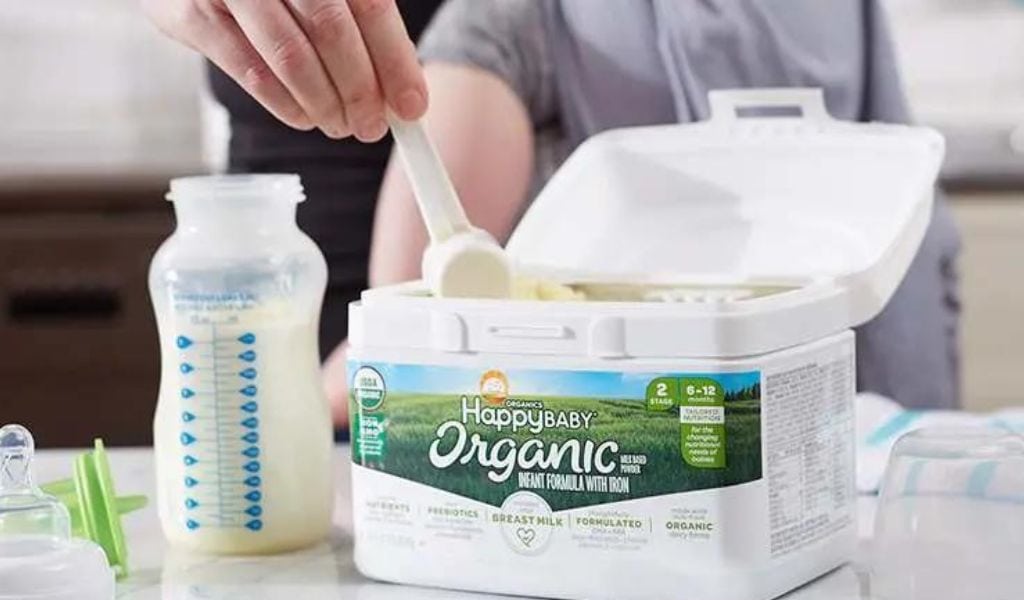
Organic vs. Conventional Baby Formula
Organic formula does not necessarily mean healthier formula (or any food for that matter). A formula can still have unwanted ingredients, though organic, and yet still not be recommended ingredients for your baby. Organic sugar and fillers are still sugar and fillers. The type of protein, carbs and fat, etc. are more important than whether these ingredients are organic or not. However, if you can find a formula that meets your baby’s needs and your preferences when it comes to protein, fat, carbs, iron, DHA, etc, AND it’s organic, then by all means, buy the organic one if it fits in your budget.
Organic formula will be free from synthetic pesticides, synthetic hormones and antibiotics which may have long-term health effects.
Types of Organic Formula
Cow’s Milk Formula
This is what is recommended as the first choice for most babies. A majority of babies will be fine with these formulas and tolerate them well. The proteins in cow’s milk formula are whey and protein, which are actually both found in breastmilk, too, just in different ratios. If you want formula to more resemble breast milk, you may want to choose a formula that has additional whey added.
Goat’s Milk Formula
Goat’s milk actually has the same proteins, whey and casein, as cow’s milk, so if your baby has been diagnosed with a cow’s milk protein allergy, he will not be able to tolerate goat’s milk formula either. However, if your baby just has a sensitivity to cow’s milk, goat’s milk may help, because it is digested more quickly and completely than cow’s milk. This could result in less gas, cramping, and constipation, and therefore discomfort, for your baby.
Unfortunately, there are no U.S. infant goat’s milk formulas on the market yet so you’ll have to get a European brand.
Soy Based Formula
This is the alternative if your baby has galactosemia, is truly lactose intolerant, or if your family is vegan and does not consume milk products. U.S. soy-based products are lactose-free (which means the carbohydrates are likely coming from corn syrup); however European soy-based formulas have a minimum of 30% lactose as the carbohydrate.
Hypoallergenic Baby Formula
Cow, goat and soy proteins are larger than proteins found in breastmilk and therefore harder for your baby to digest. They’re also more allergenic. Formulas that are hypoallergenic have had these proteins broken down or predigested to create less of an immune response, and to help ease digestion for your baby. These formulas are labeled as partially hydrolyzed, extensively hydrolyzed and free amino acid-based, depending on how much the proteins have been broken down. They are usually recommended for babies who are at risk for food allergies or certain immune diseases.
Free amino acid formulas are meant for babies who have severe digestion problems and cannot digest protein and should only be given under the supervision of their pediatrician. As always, consult your pediatrician when choosing any formula.
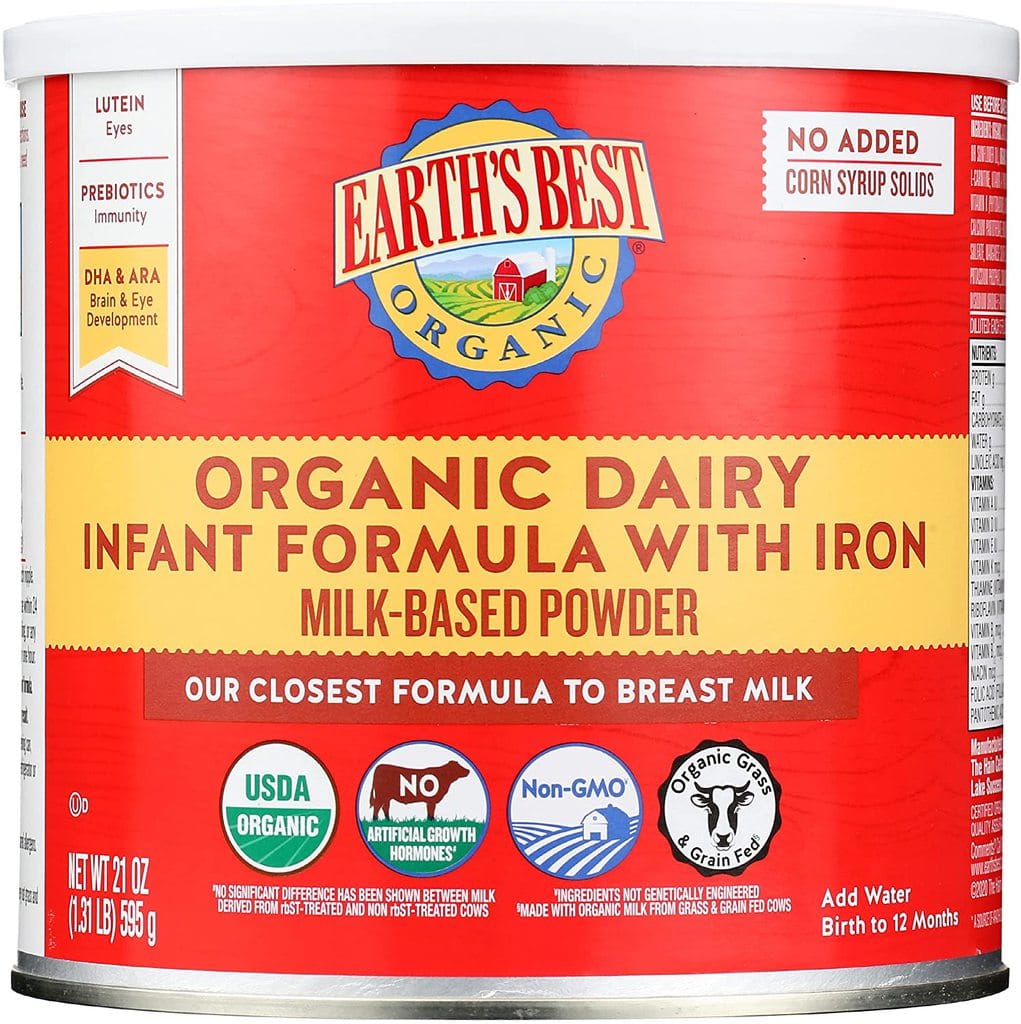
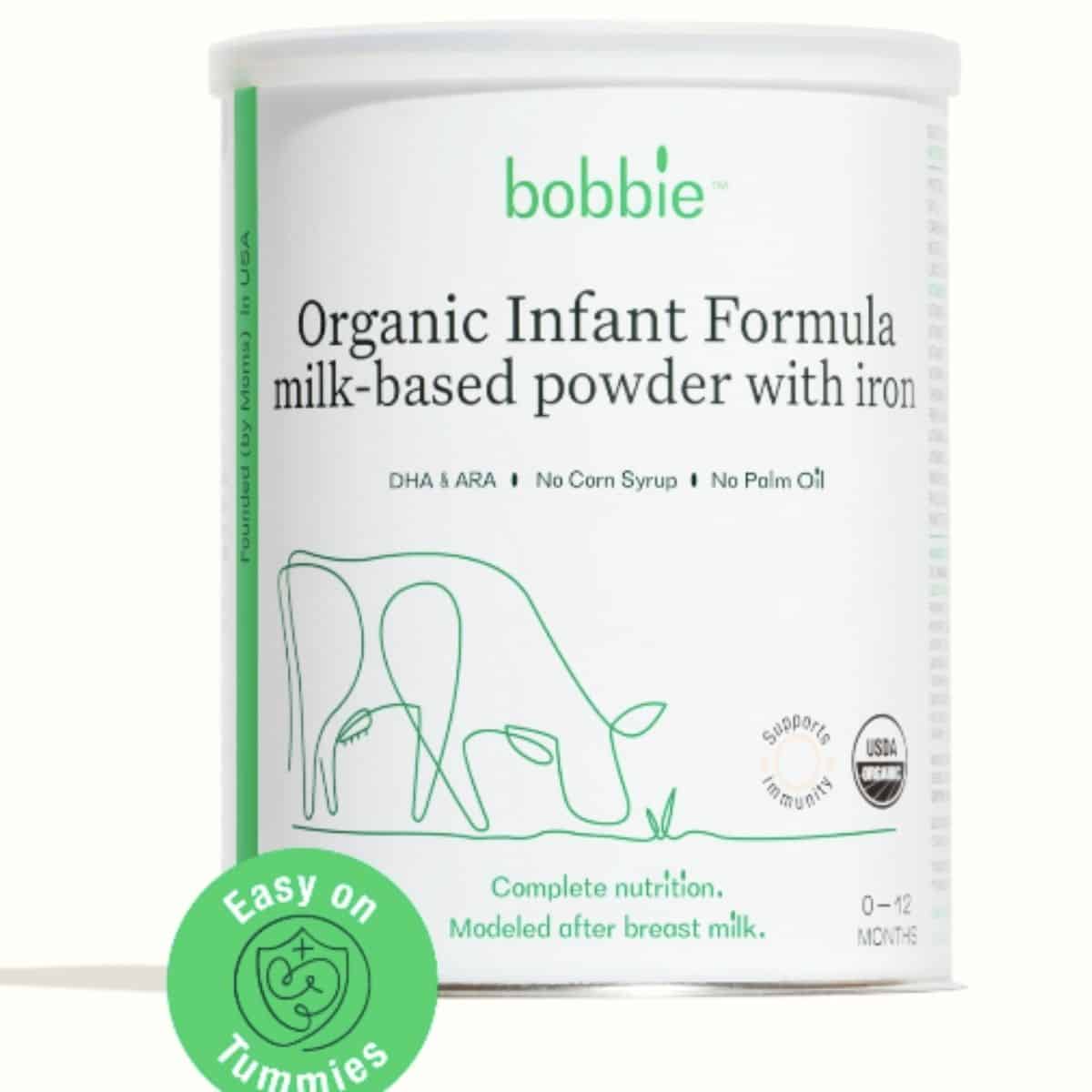
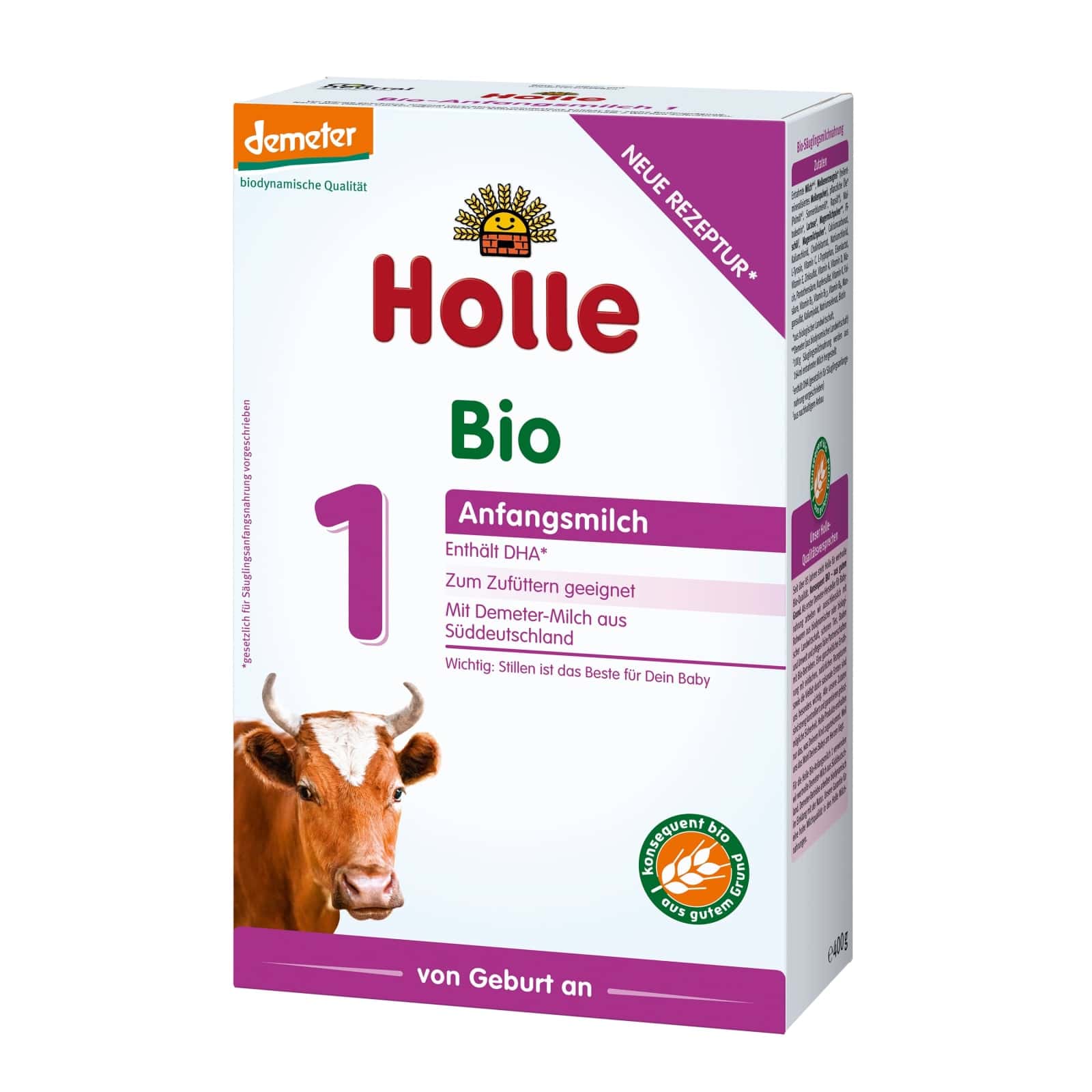
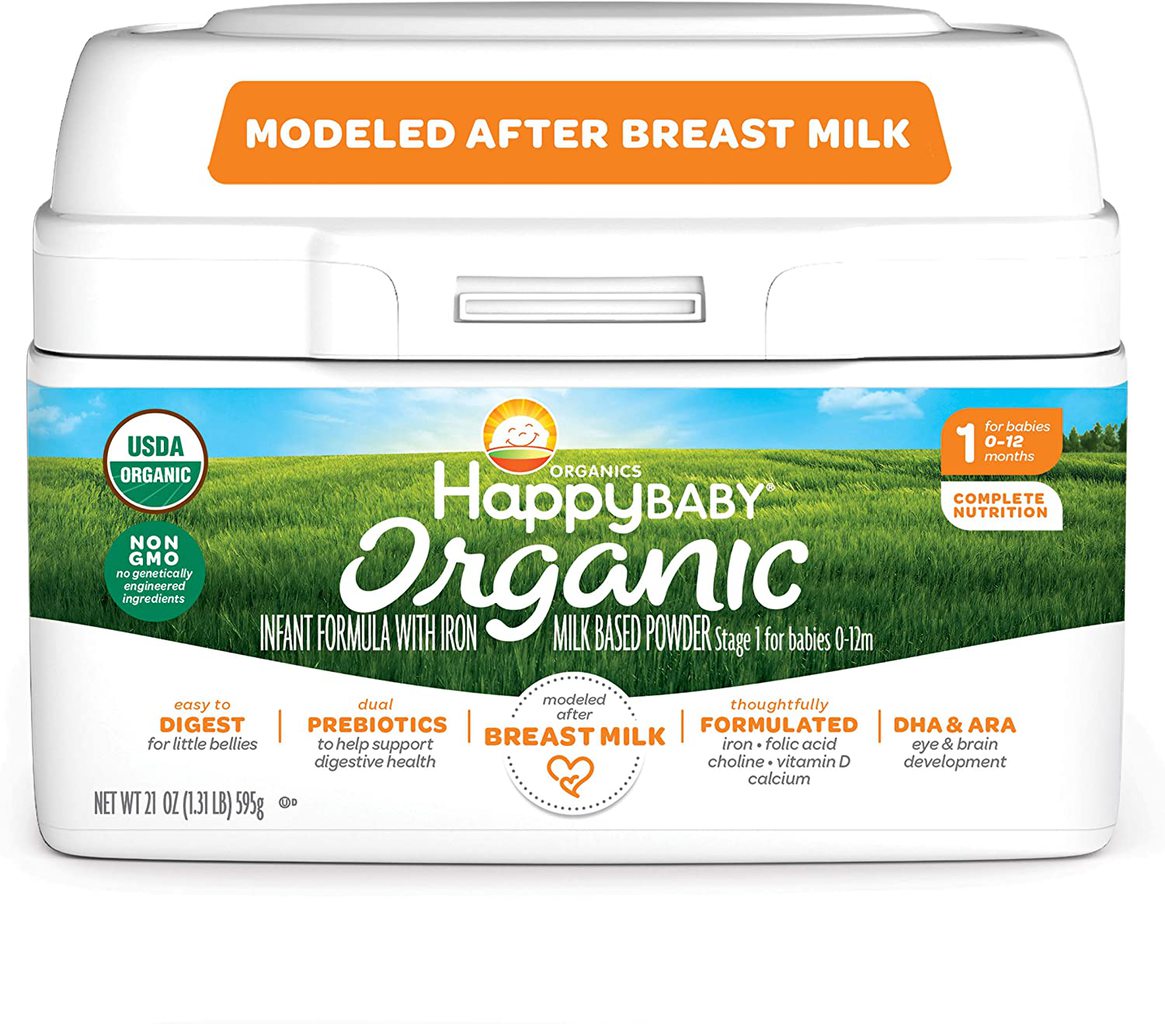
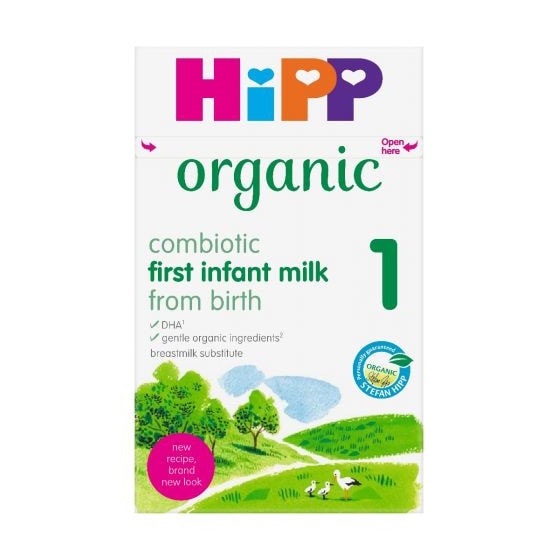
US vs. European Formula Brands
All formulas sold in the US have undergone strict regulation by the FDA and meet the minimally required standards for formulas to meet infants’ needs. European formulas bypass safety regulations set forth by the FDA which can increase their risk of contamination. This is not to say European formulas are not safe, they just have a different set of regulations in Europe. And when they are imported illegally, there’s a higher risk of being tampered with, so if you choose to buy a European formula, make sure you are using a trusted 3rd party seller.
Also, keep in mind not all versions of the formula are the same. Brands have manufacturers in different countries so they may have different ingredients than what you are expecting, depending on what country your specific box of formula is coming from, and the label may be in a different language. Make sure your supplier can tell you what is in the formula you are buying if you cannot read the label and what manufacturer or version you are buying.
Make sure your supplier has an established supply chain and will not have an unexpected shortage once you place your order. Ideally, they will maintain a local U.S. inventory so the shipping estimate is accurate. I’d also confirm that they only use air freight only since it’s quicker than a boat to reduce the chance that the product has been exposed to high heat and is not expired.
Here are some major key differences in US and European formulas…
Farming practices
In Europe, all infant formulas are required to be completely free of all pesticides, which is essenially organic. In the US, synthetic pesticides can be used, or crops may have been contaminated by neighboring farms that are not organic and subsequently have traces of pesticides on them. In Europe, standards are stricter and most formulas come from grass-fed, sustainable farms.
Staging System
European formulas follow a staging system that is regulated and these stages have different nutrients in them based on the needs of the child. In the U.S., these stages are not required or regulated.
Iron
European formula does not have as much iron included as U.S. formulas do. Their requirement is about as half as much as what the U.S. requires.
Carbohydrates/Sugar
The U.S. does not have requirements on the type of carbohydrate found in formulas- it can be anything from lactose to sucrose to corn syrup. European formulas do not allow any sucrose in their formulas, and have a minimum requirement of 30% lactose, even in soy formulas.
Additives
European standards are more conservative when it comes to additives- they do not contain any gums or carrageenan.
Reviews of the Best Organic Baby Formulas
1. Best Overall: Happy Baby Organics Infant Formula

Happy Baby Organics has 4 times more prebiotics than most other organic milk-based formulas, including fibers that mimic the function of the prebiotics found naturally in breast milk. Made with milk from organic dairy farms, it’s formulated with DHA, ARA, iron, folic acid, choline, vitamin D and calcium. Plus, it contains lactose, which is also present in breastmilk.
Formula Options:
Pros:
- No corn syrup solids
- No carrageenan
Cons:
- Tends to produce foam when mixing
What Others Are Saying:
The Bump named Happy Baby Organics the best organic formula overall, What to Expect awarded it the best formula with prebiotics, and it has a 4.7-star rating on Amazon with more than 2,900 reviews.
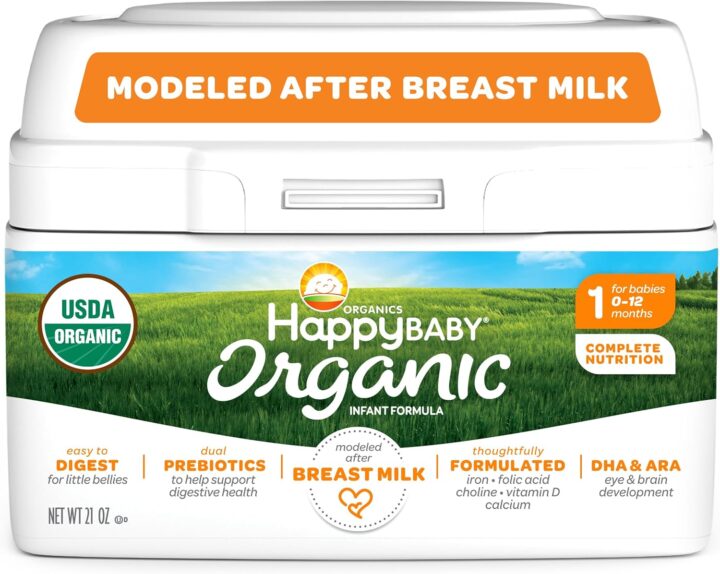
2. Best for Breastfed Babies: Bobbie Organic Infant Formula

Bobbie Organic Infant Formula uses a European-style formulation with quality organic ingredients and nutritional composition. The company’s website has incredibly helpful feeding charts and offers a monthly subscription service, which can help save money. Bobbie formula contains no sucrose or glucose syrup solids, it’s gluten-free, and it’s made with lactose, DHA, and both Omega-3 and Omega-6. The biggest downside to Bobbie is that it doesn’t contain any prebiotics, which is why we recommend it for breastfed babies, since they’re getting those important prebiotics via Mom.
Formula Options:
Pros:
- Excellent quality
- No clumping
Cons:
- Doesn’t contain prebiotics
- Expensive
What Others are Saying:
Good Housekeeping named Bobbie the best overall and What to Expect calls Bobbie the best European formula alternative.

3. Best Sensitive Formula: Earth’s Best Organic Sensitivity
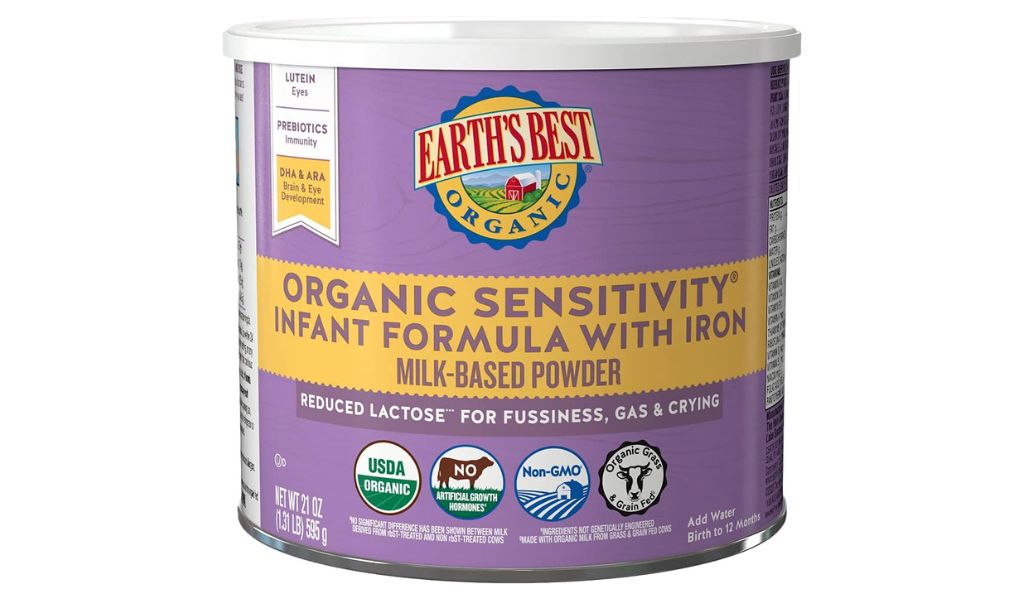
Designed especially for babies with fussiness or gas, Earth’s Best Organic Sensitivity contains 95% less lactose than other milk-based infant formulas. This means that it’s easier to digest for babies with sensitive tummies. We love that Earth’s Best Organic Sensitivity is fortified with iron for red blood cell development and contains DHA and ARA, two fatty acids found in breast milk that help support brain and eye health.
Formula Options:
Pros:
- No added corn syrup solids
- Reduce lactose formula
Cons:
- Contains palm oil
- Strong odor
What Others are Saying:
Healthline picked Earth’s Best Organic Sensitivity as the best organic formula, and it has a 4.7-star rating from over 2,400 reviews on Amazon.
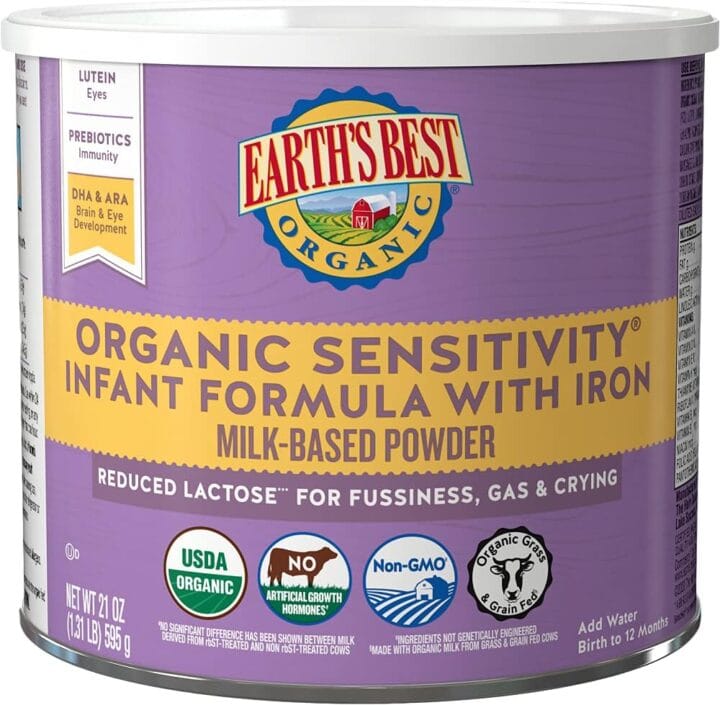
4. Best European Baby Formula: Holle

Holle is an established German company known for producing high-quality, organic powdered formulas while also using sustainable farming and manufacturing processes. All of Holle’s baby formulas are free of sucrose and corn syrups, and they contain Omega-3 and Omega-6 fatty acids, ingredients that are vital for a baby’s growth and development. Because it comes from overseas, it can be a bit tricky to get your hands on, but I’ve found it at some organic food stores.
Formula Options:
Pros:
- Added DHA
- All natural ingredients
Cons:
- Some stages contain Maltodexterin
- Contains palm oil

5. Another Great European Option: HiPP Organic

HiPP is a family-owned company that has been producing baby food for over 50 years. We love this formula’s excellent macronutrient and micronutrient contents, including the addition of Omega-3 and Omega-6 fatty acids as well as pre and probiotics. Made with high-quality milk from free-range cows, all of HiPP’s formulas are 100% organic and are gluten- and soy-free. Like other UK formulas, this can only be found at some organic food stores.
Formula Options:
Pros:
- gentle on sensitive tummies
- no maltodextrin, starch, sucrose or corn syrups
Cons:

Other Organic Baby Formulas We Considered
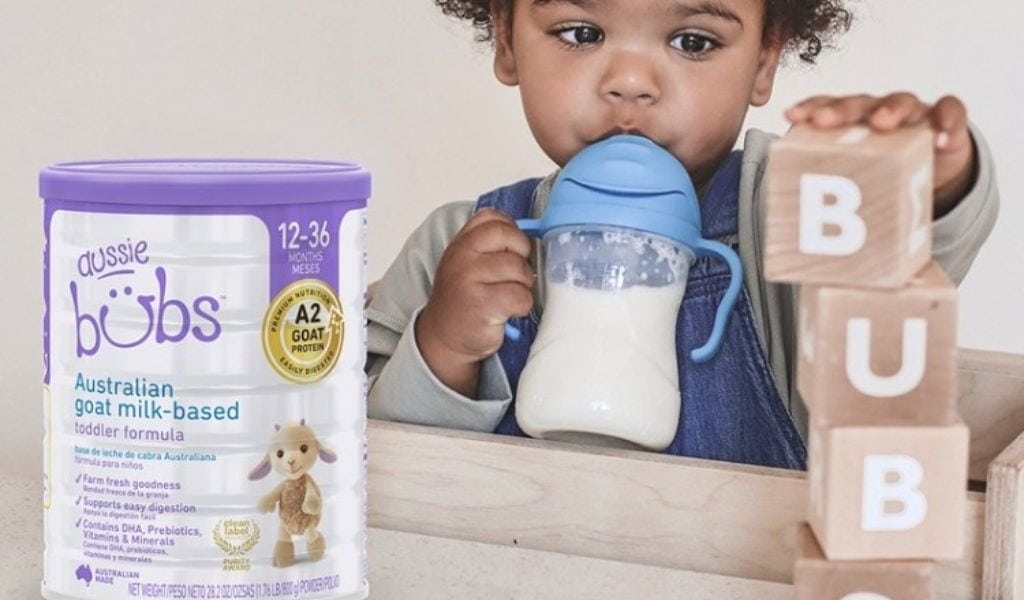
Bellamy’s Organic
Bellamy’s is an Australian infant formula brand that’s now widely available in the United States. It has no added sucrose or GMO ingredients, and it contains both DHA and ARA omegas derived from fish. Bellamy’s Organic is available at Amazon for $30.62.
Bub’s Organic Grass Fed Infant Formula
Bub’s is another Aussie brand that offers both cow and goat milk based baby formulas. We like that it’s made with milk from grass-fed cows, and that it’s free of GMO ingredients. Bub’s Organic Grass Fed Infant Formula is available at Amazon for $39.39.
Baby’s Only
The first organic baby formula in the U.S. (it was founded in 1999!), Baby’s Only contains no corn syrup or palm oil, and it’s gluten free. The only drawback? Some parents find that it’s hard for their baby to digest and causes constipation. Baby’s Only is available at Target for $27.99.
Why You Can Trust Me
I’m Michele Olivier, the creator of the Baby FoodE blog, where I post adventurous recipes ranging from babies’ first purees to equally memorable (but perhaps less enjoyable) sit-down family dinners with feisty toddlers. I began my baby blog shortly after I had my first baby girl, Elliette.
As a mom of two, I’ve “been there, done that,” meaning I know how much of a struggle it can be to feed babies. Whether you’re just looking to supplement your breastmilk with a few ounces of formula, or if you’ve transitioned to 100% formula feeding, I put together this guide to organic baby formula to help you make the best choice for you and your baby. Most of the formulas on this list are brands that I’ve personally used, and all of them have received high praise from other parents. These products were also medically reviewed by Jamie Johnson, Registered Dietitian Nutritionist (RDN), and Lauren Braaten, Pediatric Occupational Therapist (OT).


